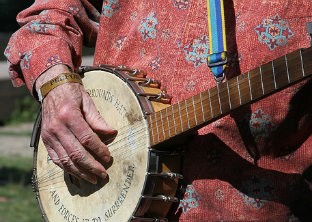"I am proud that I have never refused to sing for anybody."

At Pete Seeger’s 90th birthday party a few years back, Bruce Springsteen told him that he’d “outlasted the bastards.” Later, Springsteen compared the folk-music icon to an ass-kicking grandpa. The crowd loved it.
Did Seeger? He was never really one to call names, much less to take them. Seeger, who died this week, had a deep well of gentleness, idealism and good humor. Unlike a lot of famous people with strong moral vision, his personal life adds few asterisks to his memory. And Seeger had little use for us-vs.-them approaches to social justice, for stories with starkly drawn villains. His bad guys were hatred and violence, and his good guys were all people and their potential to do better.
Seeger’s friend Woody Guthrie wrote “This machine kills fascists” on his guitar. Seeger’s banjo offered a telling variation: “This machine surrounds hate and forces it to surrender.” No individual villains; no violence.
To be sure, Guthrie’s machine produced more interesting music. Seeger was more troubadour than artist, more in-the-trenches activist than visionary. I admired him less for his music than for the way he used it: his tireless devotion to the cause of justice, driven by remarkable optimism, moral clarity and courage. And I admired his compassion and kindness—not mild niceness but the kindness of deep conviction.
At a 1955 House Committee on Un-American Activities subcommittee meeting, both Seeger’s courage and his kindness were on display. The Commie-hunting members were pretty aggressive, especially chair Francis Walter (D–PA). In the transcript, Seeger comes off as steadfastly good natured—as he steadfastly refuses to answer any question that might confirm his or anyone else’s participation in Communist activities. Asked if he sang at Communist Party functions, he said this:
I have sung for Americans of every political persuasion, and I am proud that I never refuse to sing to an audience, no matter what religion or color of their skin, or situation in life. I have sung in hobo jungles, and I have sung for the Rockefellers, and I am proud that I have never refused to sing for anybody. That is the only answer I can give along that line.
Later he expressed repeatedly his willingness to discuss his songs, just not “who has ever listened to them.” He even offered to play one, though “I don’t know how well I can do it without my banjo.” When the members declined: “I am sorry you are not interested in the song. It is a good song.”
He wasn’t (just) being cute. Seeger really was all about singing for and especially with all kinds of people, not picking fights. By refusing either to answer the questions or to plead the Fifth, he all but begged Congress to hold him in contempt, and Congress obliged. Yet it’s hard to imagine Seeger having actual contempt for anyone.
Like a lot of non-fans of earnest folkie music, I have a favorite moment from that early-60s scene, and that moment involves Bob Dylan. There’s a video of the young Dylan performing “Only a Pawn In Their Game” at a voting-rights rally in Mississippi. (I can’t find the clip online, but I’m pretty sure D. A. Pennebaker used it in Don’t Look Back.) It’s a protest song but a remarkable and morally complex one, far beyond anything Seeger ever wrote. Yet its challenging and courageous message—that we should blame Medgar Evers’s murder on the powerful forces behind hatred, not on the man who pulled the trigger—echoes the worldview of the man whose banjo surrounded not individual haters but hate itself.
And standing behind Dylan at the rally is Seeger—not the most important artist in the frame, but the main instigator of so many efforts to sing for justice, for years before and since. We need more people like him.




